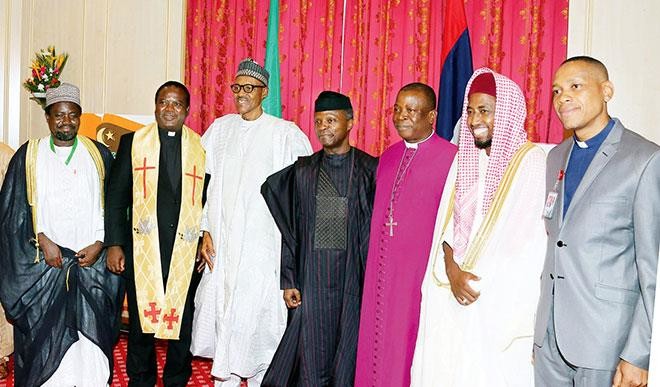Sallah homage and Buhari’s outburst
It is a tradition in the Nigerian Presidency that during festivals, residents of the Federal Capital Territory (FCT) pay homage to the president. This year’s Eid-el-fitr was no exception. As early as 9.30am on Wednesday, a throng of them converged on the Aso Rock residence of President Muhammadu Buhari, for what has become something of […]


It is a tradition in the Nigerian Presidency that during festivals, residents of the Federal Capital Territory (FCT) pay homage to the president. This year’s Eid-el-fitr was no exception. As early as 9.30am on Wednesday, a throng of them converged on the Aso Rock residence of President Muhammadu Buhari, for what has become something of a ritual.
Those on the Sallah homage, according to the Senior Special Assistant to the President on Media and Publicity Mallam Garba Shehu, who served as the compere at the event, were Abuja residents “from diverse backgrounds”.
Had Mallam Shehu disclosed the criteria used in selecting the president’s guests, perhaps, the reasons those living in Abaji, Gwagwalada, Zuba, Karu, Kuje, Kubwa and other Abuja satellite towns and slums were not in attendance would have been known.
The president’s guests, mostly Muslim faithful, who were led by the Minister of the FCT Mohammade Musa Bello, were joined by traditional rulers and Christian clerics. This, Garba Shehu noted, was also a demonstration of the nation’s unity in diversity.
The vice president, Professor Yemi Osinbajo, who is also a pastor of the Redeemed Christian Church of God (RCCG), led some members of the Federal Executive Council and other top government officials to President Buhari’s residence for the Sallah homage.
Unlike in the past, the Sallah homage was not attended by the president of the Senate, Abubakar Bukola Saraki and the Speaker of the House of Representatives, Yakubu Dogara. But they sent representatives.
Apart from prayers and goodwill messages, highlights of the event included eating and drinking as well as presentation of a giant season’s card to the president by the FCT minister; and a big mirror, by representatives of the Aso Rock Villa Chapel. The president and his deputy thereafter took time to shake hands and pose for photographs with the visitors.
But earlier, the president, in a bid to reiterate his government’s commitment to fighting insecurity and corruption as well as fixing the power sector, shocked his visitors by his outburst of anger and frustration.
The visibly disturbed president promptly passed a verdict on the nation’s power sector. On several occasions in the past, Buhari had always claimed that living in the State House does not in any way alienate him from the suffering of the citizenry. Re-echoing this during the Sallah homage, he admitted that despite the change in name and form of the National Electric Power Authority (NEPA), power supply has lamentably remained unreliable.
That, according to President Buhari, explains “why the radio has become a major source of information dissemination because those who do not have electricity at home can easily walk to a barber’s shop or a drinking joint to listen to the radio before continuing their journeys.”
The president further decried: “Those who watch television are at the mercy of what used to be called NEPA. Whichever form it (NEPA) has taken now, it has maintained the tradition of unreliability. It is not everyday that the people get the news.”
Does the president believe that electricity is all about providing access to news? Those who thought he would also acknowledge that the epileptic power supply in the country had led to the collapse of businesses were wrong.
President Buhari also seized the opportunity to draw his guests’ attention to the continued attacks on oil and gas installations in the Niger Delta region. He confessed that while a lot of improvement had been recorded in the fight against the insurgency in the northeast, the militancy in the Niger Delta region was biting hard.
Although his guests are not leaders of the Niger Delta, President Buhari gave them a task they did not envisage when he asked them to caution the militants. “Please, pass the message to the militants that one Nigeria is not negotiable. They (the militants) had better accept this fact. The Nigerian constitution is very clear as to what thy should get, and I wish to assure them that there will be justice.”
Buhari’s visitors were also handed another responsibility they never bargained for. This time, he was speaking on his administration’s anti-corruption war. The president presumed that his guests are in a position to compel the treasury looters to come out for negotiation on how to return the stolen funds.
“Please, tell those with plenty of money which does not belong to them to try and negotiate and return it so that they and us would be in peace. Otherwise, we would continue to look for it,” he threatened. The president did not clarify what he meant by negotiation in this regard. But he could be misconstrued to have meant that the looters would be left off the hook if they choose to return the loots.
Buhari also made an issue out of the presence of the acting chairman of the Economic and Financial Crimes Commission (EFCC), Ibrahim Magu. He said while the helmsman of the anti-graft agency would prefer operating from behind the scene, he (Buhari) had to introduce him to the guests so that they could recognise him whenever he (Magu) “knocks” at their doors one day; a parable capable of sending shivers down the spine of any corrupt individual in attendance.
